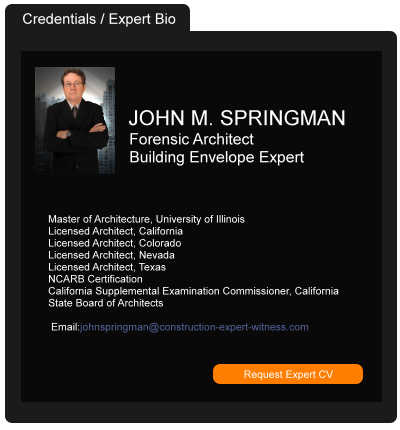California Supreme Court Declines to Create Exception to Privette Doctrine for “Known Hazards”
September 13, 2021 —
Tracy D. Forbath - Lewis BrisboisIn Gonzalez v. Mathis (Aug. 19, 2021, S247677) __ Cal.5th___, the California Supreme Court reversed an appellate decision holding that a landowner may be liable to an independent contractor, or the contractor’s workers, for injuries resulting from “known hazards,” as running contrary to the Privette doctrine.
In Gonzalez, the contractor, who specialized in washing skylights, slipped and fell while accessing the landowner’s particularly hard to reach skylight from a narrow retaining wall that was allegedly covered in loose gravel and slippery. (Slip opn., p. 3.) While the trial court initially granted the landowner summary judgment pursuant to the Privette doctrine, the appellate court reversed and held that the landowner had a responsibility to take reasonable safety precautions where there was a known safety hazard on the landowner’s premises. (Id. at p. 6.) Whether the landowner could have taken various safety precautions also raised disputed issues of material fact precluding summary judgment. (Ibid.)
However, the California Supreme Court concluded that no broad, third exception to the Privette doctrine lies; “unless a landowner retains control over any part of the contractor’s work and negligently exercises that retained control in a manner that affirmatively contributes to the injury [citation], it will not be liable to an independent contractor or its workers for an injury resulting from a known hazard on the premises.” (Slip opn., p. 2.)
Read the court decisionRead the full story...Reprinted courtesy of
Tracy D. Forbath, Lewis BrisboisMs. Forbath may be contacted at
Tracy.Forbath@lewisbrisbois.com
Receiving a $0 Verdict and Still Being Deemed the Prevailing Party for Purposes of Attorney’s Fees
May 24, 2018 —
David Adelstein - Florida Construction Legal UpdatesLow and behold, a party can be the prevailing party for purposes of attorney’s fees even if that party is awarded $0. That’s right, even if the party is awarded a big fat zero, they can still be the prevailing party for purposes of being entitled to attorney’s fees. This is because a party is the prevailing party if they prevail on the significant issues in the case. A party can prevail on the significant issues even if that party is awarded $0. Whoa!
For example, in Coconut Key Homeowner’s Association, Inc. v. Gonzalez, 43 Fla.L.Weekly D1045a (Fla. 4th DCA 2018), a homeowner sued her homeowner’s association claiming the association breached its governing documents. There was a basis for fees under Florida’s homeowner’s association law (and there likely was a basis under the governing documents). At trial, the jury held that the association breached its governing documents, but awarded the homeowner nothing ($0). The trial court also issued injunctive relief in favor of the homeowner. The homeowner claimed she should be deemed the prevailing party for purposes of attorney’s fees; however, this was denied by the trial court based on the $0 verdict and no fees were awarded to the homeowner.
Read the court decisionRead the full story...Reprinted courtesy of
David Adelstein, Florida Construction Legal UpdatesMr. Adelstein may be contacted at
dadelstein@gmail.com
Blurred Lines: New York Supreme Court Clarifies Scope of Privileged Documents in Connection with Pre-Denial Communications Prepared by Insurer's Coverage Counsel
September 17, 2015 —
Greg Steinberg – White and Williams LLPIn a recent decision, the New York Supreme Court clarified the scope of privileged documents with respect to communications prepared by an insurer’s counsel prior to issuing a denial of coverage letter. The coverage litigation at issue arose out of MF Global Inc.’s claims under fidelity bonds for losses incurred as a result of large trades made by former MF Global employee, Evan Dooley. The trades cost MF Global, Dooley’s former clearing firm, $141 million after it had to reimburse the CME Group, Inc. futures clearinghouse that handled the trade. The insurers that issued the fidelity bonds contested coverage and sued MF Global in 2009.
The opinion underscores the fact that there is no “bright line” rule in New York with respect to disclosure of communications in the insurance context prior to the issuance of a coverage determination – the disclosure requirement will instead turn on what’s actually privileged. In addition, while retention of counsel may not serve as an automatic shield for all documents prepared prior to the coverage decision, insurers will not be required to disclose, among other things, communications which include an “indicia of the provision of legal services.”
Read the court decisionRead the full story...Reprinted courtesy of
Greg Steinberg, White and Williams LLPMr. Steinberg may be contacted at
steinbergg@whiteandwilliams.com
Texas Supreme Court Holds Stipulated Extrinsic Evidence May Be Considered in Determining Duty to Defend
May 10, 2022 —
Tred R. Eyerly - Insurance Law HawaiiResponding to certified questions from the Fifth Circuit, the Texas Supreme Court held that in limited circumstances, extrinsic evidence may be considered in determining the duty to defend. Monroe Guar. Ins. Co. v. Bitco Gen. Ins. Corp., 2022 Tex. LEXIS 148 (Tex. Feb. 11, 2022).
The two insurers each provided CGL coverage to the insured, 5D Drilling & Pump Service, Inc., at different times. BIitco provided two consecutive one-year CGL policies covering October 2013 to October 2015. Monroe's CGL policy covered 5D from October 2015 to October 2016.
5D was sued by David Jones for breach of contract and negligence, seeking damage allegedly resulting from 5D's drilling operations on Jones's property. Jones contracted with 5D in the summer of 2014 to drill a 3600-foot irrigation well on his farmland. The complaint did not detail when 5D's purportedly negligent acts occurred or even when 5D began or stopped the work.
Read the court decisionRead the full story...Reprinted courtesy of
Tred R. Eyerly, Damon Key Leong Kupchak HastertMr. Eyerly may be contacted at
te@hawaiilawyer.com
Unjust Enrichment and Express Contract Don’t Mix
August 23, 2021 —
Christopher G. Hill - Construction Law MusingsI am a huge fan of clearly written construction contracts. Virginia state and federal courts will interpret contract provisions as written and will seek to enforce all of those terms where possible. Where the contract is ambiguous, we construction attorneys make money and the courts are forced to make decisions that the parties may not like.
A recent case out of the Eastern District of Virginia federal court highlights the ways in which a clear contract affects the claims that can be brought and limits the scope of possible litigation. In First Call Environmental LLC v. Murphy Oil USA LLC, the Court looked at a relatively typical Owner, Contractor, Subcontractor set of agreements. In this matter, Murphy Oil entered a contract with National Rapid Response, Inc. (“NRR”) whereby NRR would provide emergency and environmental management and waste disposal services to Murphy Oil. NRR then subcontracted with the Plaintiff First Call to perform the services for Murphy Oil. First Call filed suit against Murphy Oil alleging two counts: breach of contract (based on a third-party beneficiary theory), and unjust enrichment.
Read the court decisionRead the full story...Reprinted courtesy of
The Law Office of Christopher G. HillMr. Hill may be contacted at
chrisghill@constructionlawva.com
With VA Mechanic’s Liens Sometimes “Substantial Compliance” is Enough (but don’t count on it) [UPDATE]
October 14, 2019 —
Christopher G. Hill - Construction Law MusingsVirginia mechanic’s liens are a powerful and tricky beast that in most cases require absolute precision in their preparation. However, an interesting opinion recently came out of the Virginia Supreme Court that may provide a bit of a “safe harbor” from the total form over function nature of a mechanic’s lien.
In Desai, Executrix v. A.R. Design Group Inc., the Court considered a lien memorandum that had what could be described as technical flaws in the preparation of the mechanic’s lien by A. R. Design Group. The basic facts are that A. R. Design Group used the form of lien found in Va. Code Sec. 43-5 (also found as Form CC-1512 at the Virginia Judiciary website) when it recorded two lien memoranda for two pieces of property owned by a trust. Relating to one of the two properties, the memorandum failed to identify the “Owner” as the trustee of the trust. On the memoranda relating to both properties the affidavit verifying the amounts claimed did not identify the signatory as agent for A. R. Design Group, instead listing the agent as the claimant and further failed to state a date from which interest is claimed or a date on which the debt was due.
Needless to say, the owner argued that each of these technical defects invalidated the memoranda and therefore they should have been released. Somewhat surprisingly the Fairfax, Virginia Circuit Court disagreed and held the liens to be valid. On appeal, the Virginia Supreme Court affirmed the lower court. The held that the failure to add the word “Trustee” after Ulka Desai’s name did not invalidate the lien because the trustee had all of the rights of ownership and furthermore that naming Desai in the memorandum served the purpose of putting third parties on notice of the lien.
Read the court decisionRead the full story...Reprinted courtesy of
The Law Office of Christopher G. HillMr. Hill may be contacted at
chrisghill@constructionlawva.com
Contractors Prepare for a Strong 2021 Despite Unpredictability
April 05, 2021 —
Kenny Ingram - Construction ExecutiveA recent IFS study found many construction and engineering companies are reimagining their business models to ensure a secure future, using the pandemic-induced lull in business to prepare themselves to get back to operations on a strong footing.
The research shows 70% of businesses have increased or maintained digital transformation spend, despite the COVID-19 pandemic. In the infrastructure, engineering and construction sectors the figure is more than 75%.
There are many challenges the industry will face in the new year following the unpredictability of 2020, but there are also many opportunities. Despite the uncertainties that lay ahead, here are the few trends predicted to impact the sector 2021 and beyond.
Reprinted courtesy of
Kenny Ingram, Construction Executive, a publication of Associated Builders and Contractors. All rights reserved.
Read the court decisionRead the full story...Reprinted courtesy of
General Contractor’s Intentionally False Certifications Bar It From Any Recovery From Owner
November 03, 2016 —
Masaki James Yamada – Ahlers & Cressman PLLCIn a public works dispute in Massachusetts, a Massachusetts Court judge ruled that a general contractor could not recover any of its over $14 million claim against a public owner because it had violated its contract with the Owner by certifying that it had paid its subcontractors in full and on time when in fact it had not.[i] The case involves a contract dispute arising from a state and federally-funded project to design and construct a fiber optic network in western Massachusetts. The Owner was a state development agency established and organized to receive both state and federal funding to build a 1,200–mile fiber optic network known as MassBroadband123 in Western Massachusetts (the Project). Of that amount, $45.4 million was awarded pursuant to the American Recovery and Reinvestment Act of 2009 (ARRA). One of the stated goals of ARRA was (as its title suggests) to create jobs in the wake of the 2008 recession and to provide a direct financial boost to those impacted by the economic crisis. In the context of the instant case, that meant that, if there were to be subcontractors on the job providing labor and materials, they needed to be paid on a timely basis in keeping with the statutory purpose of stimulating the economy.
Read the court decisionRead the full story...Reprinted courtesy of
Masaki James Yamada, Ahlers & Cressman PLLCMr. Yamada may be contacted at
myamada@ac-lawyers.com


































































